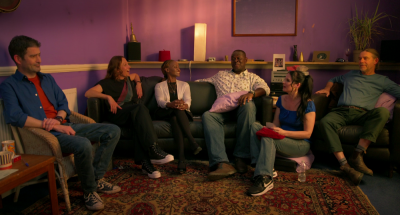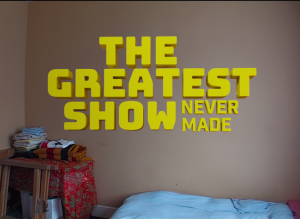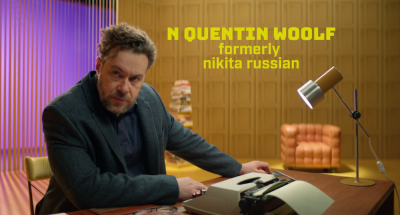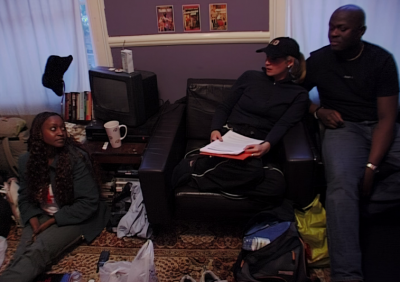The Greatest Show Never Made
(→Web links) |
|||
| (19 intermediate revisions not shown) | |||
| Line 1: | Line 1: | ||
[[File:The Greatest show never made title screen from ep1.png|300px]] | [[File:The Greatest show never made title screen from ep1.png|300px]] | ||
| + | |||
<div class="box"> | <div class="box"> | ||
| + | |||
== Host == | == Host == | ||
| Line 11: | Line 13: | ||
== Broadcast == | == Broadcast == | ||
| - | Safe Harbour and B Good Picture Company for | + | Safe Harbour Films and Factual Fiction in association with B Good Picture Company for Amazon Prime Video, 11 October 2023 (3 episodes in 1 series) |
</div> | </div> | ||
| + | |||
== Synopsis == | == Synopsis == | ||
| - | In 2001, Nikita Russian came up with the idea for a reality TV series. In 2002, [[The Great Reality TV Swindle]] told the story of how that idea crashed and burned. In 2023, Amazon Prime Video revisited the story, expanding it to three 40-50 minute episodes and | + | In 2001, Nikita Russian came up with the idea for a reality TV series. In 2002, [[The Great Reality TV Swindle]] told the story of how that idea crashed and burned. In 2023, Amazon Prime Video revisited the story, expanding it to three 40-50 minute episodes. |
| + | |||
| + | The first sets the scene and covers the initial contestant call, the auditions, and the show launch, at which doubts began to surface, fueled by Russian reneging on his promise that food, accommodation and subsistence money would be provided - leading to two teams dropping out almost immediately, and the third refusing to sign their contracts and repairing to cameraman Tim's flat to ponder their options. This team (along with Russian himself) are the main focus of the series, though we will also hear from a member of another team whose friend happened to recognise the name Nik Russian because they worked part-time at the same bookshop. The second episode shows how Russian's façade broke down, as well as looking into his history. His childhood friend Michael Fabbri fills in some of the story of the boy he knew as Keith Gillard, and we see some of the skits they filmed together. Weaving through this episode are contributions from "Person Tracing Analyst" Tanya Hall who was asked to uncover Russian's whereabouts, leading to the big end-of-episode reveal: not only did she find him, but he's been persauded to talk for this series. | ||
| + | |||
| + | <div class="image">[[File:The Greatest show never made woolf intro.png|400px]]''The man with the plan (but without the money, contacts or knowhow to pull it off)''</div> | ||
| + | |||
| + | Episode three details how the remaining team turned the tables on Russian, exposing him in a story on ''London Tonight'', but also allows the fomer Nik Russian (now N Quentin Woolf) to give his side of the story. The six team members, previously interviewed separately, are finally reunited and we get an update on what happened to them after the show that never was. With perhaps one exception, they are broadly sympathetic to Russian who in hindsight they see as a fantastist out of his depth rather than a conman. And indeed, while Amazon categorise this as a "true crime" documentary, no actual crime took place. | ||
| + | |||
| + | <div class="image">[[File:The Greatest show never made rosy jane daniel original footage.png|400px]]''Three of the contestants - Rosy, Lucie and Daniel - seen in original footage from 2002.''</div> | ||
| - | + | While ''The Great Reality TV Swindle'' from its title down invited the interpretation that gullible people had been the victims of a scam (illustrated here by a clip of [[Harry Hill]] mocking them on that basis on ''TV Burp''), ''The Greatest Show Never Made'' takes a more balanced view informed by twenty years of hindsight and an unfashionable degree of empathy for all involved. There is perhaps an argument that certain details mentioned in ''Swindle'' and suggestive of deliberate deception have been conveniently overlooked here, such as Russian's claims to have, or to be on the verge of getting, financial backing from entrepreneurs including Stelios Haji-Ioannou, and the implication that he got free use of Raven's Ait Island for the auditions by lying to the management. However, we do see that there ''was'' after all a coherent, if perhaps overly idealistic, concept behind the show - one that might even have found a channel willing to commission it, albeit not from a ramshackle one-man operation like Nikita Russian Productions. The "business TV" boom hadn't quite arrived in 2002 but the idea of challenging people to make a million pounds in a year might have been a flyer even then, if you actually cast people who wanted to do that, instead of springing it on your participants on the first day of filming. And the notion of having the teams film and present the footage themselves wasn't a crazy idea - it was (though this series fails to point it out) basically the same model used for the docusoap ''Castaway 2000''. Where it fell down was that Russian's notion of depending on the kindness of strangers may have worked when it came to blagging some ingredients to make a cake (a task given to hopefuls at the audition, and noted by several participants, as well as the hired director, as having been a lot of fun to do), but not when trying to get a commission for an ambitious and poorly-planned reality show produced by an unknown and filmed by semi-amateurs. | |
| - | = | + | <div class="image">[[File:The Greatest show never made reunion1.png|400px]]''And here with three more, reunited in this series' final episode.<br>Left to right: John Comyn, Lucie Miller, Rosy Burnie, Daniel Pope, Jane Marshall, Tim Eagle.''</div> |
| - | + | We read that the process of getting people to take part in this documentary was a protracted one - the participants had all moved on and not unreasonably feared this show would be another stitch-up. (The fate of two other members of the team - one prominent in the archive footage but never named, the other apparently edited around and with their face blurred when an appearance was unavoidable - is not addressed.) However in the event, the production is distinguished by its determination ''not'' to stitch anyone up, not even the easy target of Woolf/Russian himself (the show commission was originally announced as two episodes but later expanded to three, which suggests Woolf agreed to be involved at a late stage). Rather than mocking or vilifying anybody, ''The Greatest Show Never Made'' actually aims to understand how and why the fiasco occurred. And although they may have felt burned by both the original events and the reaction to the earlier documentary, the key participants seem to be enjoying revisiting the camaraderie of that week in 2002. The interviews are filmed on a detailed re-creation of the flat seen in the original footage, and more than one contributor whoops with delight upon first walking into it. They throw themselves into cartoonish cutaway scenes illustrating (you couldn't call it "re-creating") their lives at the time of the original show and look back at their youthful misadventures with more bemusement than anger. Without ever expressly spelling it out, the show leans heavily into concepts like "forgiveness", "redemption" and "closure". The decision not to have Woolf meet the participants does feel a little like the producers were scared of ruining their slightly pat but more-or-less happy ending but in truth it's probably better this way. | |
| - | + | == Web links == | |
| - | + | [http://www.amazon.co.uk/dp/B0CHJN4JZY/ Amazon Prime Video programme page] | |
[[Category:Documentary|Greatest Show Never Made, The]] | [[Category:Documentary|Greatest Show Never Made, The]] | ||
| + | [[Category:Webcast|Greatest Show Never Made, The]] | ||
Current revision as of 19:45, 11 March 2024
Contents |
Host
no host, no voiceover
Co-hosts
Principal contributors: Rosy Burnie, John Comyn, Tim Eagle, Jane Marshall, Lucie Miller, Daniel Pope and N Quentin Woolf
Broadcast
Safe Harbour Films and Factual Fiction in association with B Good Picture Company for Amazon Prime Video, 11 October 2023 (3 episodes in 1 series)
Synopsis
In 2001, Nikita Russian came up with the idea for a reality TV series. In 2002, The Great Reality TV Swindle told the story of how that idea crashed and burned. In 2023, Amazon Prime Video revisited the story, expanding it to three 40-50 minute episodes.
The first sets the scene and covers the initial contestant call, the auditions, and the show launch, at which doubts began to surface, fueled by Russian reneging on his promise that food, accommodation and subsistence money would be provided - leading to two teams dropping out almost immediately, and the third refusing to sign their contracts and repairing to cameraman Tim's flat to ponder their options. This team (along with Russian himself) are the main focus of the series, though we will also hear from a member of another team whose friend happened to recognise the name Nik Russian because they worked part-time at the same bookshop. The second episode shows how Russian's façade broke down, as well as looking into his history. His childhood friend Michael Fabbri fills in some of the story of the boy he knew as Keith Gillard, and we see some of the skits they filmed together. Weaving through this episode are contributions from "Person Tracing Analyst" Tanya Hall who was asked to uncover Russian's whereabouts, leading to the big end-of-episode reveal: not only did she find him, but he's been persauded to talk for this series.
Episode three details how the remaining team turned the tables on Russian, exposing him in a story on London Tonight, but also allows the fomer Nik Russian (now N Quentin Woolf) to give his side of the story. The six team members, previously interviewed separately, are finally reunited and we get an update on what happened to them after the show that never was. With perhaps one exception, they are broadly sympathetic to Russian who in hindsight they see as a fantastist out of his depth rather than a conman. And indeed, while Amazon categorise this as a "true crime" documentary, no actual crime took place.
While The Great Reality TV Swindle from its title down invited the interpretation that gullible people had been the victims of a scam (illustrated here by a clip of Harry Hill mocking them on that basis on TV Burp), The Greatest Show Never Made takes a more balanced view informed by twenty years of hindsight and an unfashionable degree of empathy for all involved. There is perhaps an argument that certain details mentioned in Swindle and suggestive of deliberate deception have been conveniently overlooked here, such as Russian's claims to have, or to be on the verge of getting, financial backing from entrepreneurs including Stelios Haji-Ioannou, and the implication that he got free use of Raven's Ait Island for the auditions by lying to the management. However, we do see that there was after all a coherent, if perhaps overly idealistic, concept behind the show - one that might even have found a channel willing to commission it, albeit not from a ramshackle one-man operation like Nikita Russian Productions. The "business TV" boom hadn't quite arrived in 2002 but the idea of challenging people to make a million pounds in a year might have been a flyer even then, if you actually cast people who wanted to do that, instead of springing it on your participants on the first day of filming. And the notion of having the teams film and present the footage themselves wasn't a crazy idea - it was (though this series fails to point it out) basically the same model used for the docusoap Castaway 2000. Where it fell down was that Russian's notion of depending on the kindness of strangers may have worked when it came to blagging some ingredients to make a cake (a task given to hopefuls at the audition, and noted by several participants, as well as the hired director, as having been a lot of fun to do), but not when trying to get a commission for an ambitious and poorly-planned reality show produced by an unknown and filmed by semi-amateurs.
 And here with three more, reunited in this series' final episode.
And here with three more, reunited in this series' final episode.Left to right: John Comyn, Lucie Miller, Rosy Burnie, Daniel Pope, Jane Marshall, Tim Eagle.
We read that the process of getting people to take part in this documentary was a protracted one - the participants had all moved on and not unreasonably feared this show would be another stitch-up. (The fate of two other members of the team - one prominent in the archive footage but never named, the other apparently edited around and with their face blurred when an appearance was unavoidable - is not addressed.) However in the event, the production is distinguished by its determination not to stitch anyone up, not even the easy target of Woolf/Russian himself (the show commission was originally announced as two episodes but later expanded to three, which suggests Woolf agreed to be involved at a late stage). Rather than mocking or vilifying anybody, The Greatest Show Never Made actually aims to understand how and why the fiasco occurred. And although they may have felt burned by both the original events and the reaction to the earlier documentary, the key participants seem to be enjoying revisiting the camaraderie of that week in 2002. The interviews are filmed on a detailed re-creation of the flat seen in the original footage, and more than one contributor whoops with delight upon first walking into it. They throw themselves into cartoonish cutaway scenes illustrating (you couldn't call it "re-creating") their lives at the time of the original show and look back at their youthful misadventures with more bemusement than anger. Without ever expressly spelling it out, the show leans heavily into concepts like "forgiveness", "redemption" and "closure". The decision not to have Woolf meet the participants does feel a little like the producers were scared of ruining their slightly pat but more-or-less happy ending but in truth it's probably better this way.
Web links
Amazon Prime Video programme page




